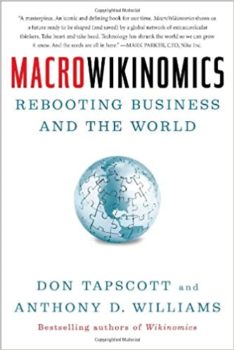Book Review
 MacroWikinomics: Rebooting Business and the World; Don Tapscott and Anthony D. Williams; Portfolio/Penguin 2010; $27.95
MacroWikinomics: Rebooting Business and the World; Don Tapscott and Anthony D. Williams; Portfolio/Penguin 2010; $27.95
Reviewed by Alan R. Earls.
In a recent check of Google search term rankings, the term “wiki” garnered more than 100 million inquires over the prior 30 days. Presumably, some portion of that traffic was generated by those seeking for MacroWikinomics or its predecessor volume, Wikinomics. But that kind of traffic is also surely a testimony to the way in which ideas enter popular culture and take on a life of their own. Thus, from Wikipedia, to the eponymous title under review, “wiki” (which literally means fast in the Hawaiian language from which it was borrowed) has become as much a prototypical sign of the times, most often attached to web sites that can be altered by users, as the terms modern, space age and 21st century, were in earlier eras.
This wiki-titled book has all the merits and defects implicit in such a moniker. It is a guide to the times and a product of them. By way of background, authors Don Tapscott and Anthony D. Williams have to their credit a previous effort, Wikinomics: How Mass Collaboration Changes Everything, which apparently inspired this second book. As in their first title, they aren’t afraid of tackling huge topics. They do so with gusto. Indeed, the authors almost seem to want to take credit for all the (positive) changes in society that have occurred since their last book hit the stores in 2007.
In essence, MacroWikinomics proposes quite simply that “open” and collaborative approaches to just about everything, as typified by the vast number of web based “wiki” sites, and open, crowdsourced, and collaborative enterprises, can and will reenergize and transform much of society and, in particular, business. This thesis is elaborated through numerous examples that purport to show the truth in this assertion. And there is some truth.
Certainly, the philosophy of “openness” aided and abetted by information technology (itself, often increasingly open in nature) is having a tremendous impact on many aspects of society. And this is doubtless just the beginning. For anyone who hasn’t been paying close attention, MacroWikinomics is, therefore, a lively primer on a changed and changing world.
However, Tapscott and Williams aren’t satisfied with making small points or claiming measured progress. So, the tone of the book is often a bit strident and the claims sometimes almost ludicrous. For instance, a business called Local Motors is hailed as the future of auto manufacturing and maybe even the death knell of the giant automakers. “Revolutionizing the auto industry, thought Rogers, [founder of Local Motors] could reduce America’s dependence on foreign oil and bring jobs back to the country’s declining manufacturing sector.” Indeed, according to its web site, Local Motors, aims to “design, manufacture and bring to market innovative, safer, more functional, lightweight, efficient cars through a revolutionary, local assembly and retail experience. These cars will revolutionize not only automobiles, but also the very structure of auto-making, auto-selling, and auto-servicing.” Reality seems somewhat more prosaic.
Translation: Local Motors is actually a high-concept version of the hot-rod shop that dates back to the 1950s, leveraging mass-produced components from large, traditional manufacturers, for the production of specialty vehicles for aficionados with deep pockets. Yes, there is a network of these shops and, yes, design input is solicited from the four corners of the globe. This is interesting but it doesn’t change much of anything, let alone the giant motor industry.
Assertions of this sort are piled on assertions at a dizzying pace throughout the book.
Another favorite is the suggestion that the mass-file-sharing phenomenon (think Napster and BitTorrent), by which many people, especially the young, get their music and videos, actually represents a “new business model” and a generation “renegotiating the definition of copyright and intellectual property.” It also represents theft and piracy. To be sure, there probably are good arguments for rethinking IP definitions and concepts such as fair use—possibly copyright protection lasts too long and is defined too broadly—but to disparage a system that has evolved over centuries for the purpose of balancing the rights of the creator and the consumer seems naive.
Throughout the book, the authors repeatedly bemoan the failure of technocrats but propose to replace them with what is really a technocratic solution–a vision of open-sourced everything—that still seems to depend in large measure on an existing, traditionally organized ecosystem.
MacroWikinomics is certainly entertaining and broadly informative. And it is heavily footnoted, making clear that this is not simply hucksterism at work— there is real information between the covers. Still the book seems to posses an excess of ambition leaves the reader with a sense of having been “sold” rather than merely informed. It is an uncomfortable feeling.
[ssba]
